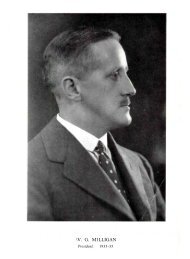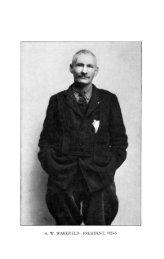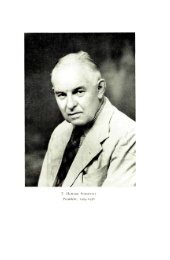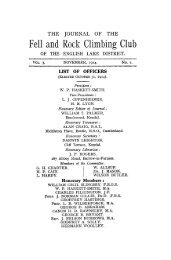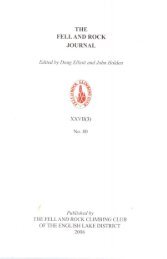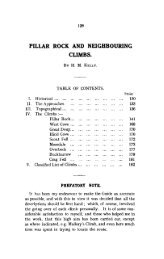Number in series 26; Year of publication 1932 - Fell and Rock ...
Number in series 26; Year of publication 1932 - Fell and Rock ...
Number in series 26; Year of publication 1932 - Fell and Rock ...
- No tags were found...
Create successful ePaper yourself
Turn your PDF publications into a flip-book with our unique Google optimized e-Paper software.
i6oSOME PYRENEAN WORDSBY W. P. HASKETT SMITHThe chief difficulty for strangers when pick<strong>in</strong>g up a foreignlanguage by word <strong>of</strong> mouth is to decide how much <strong>of</strong> what theyhear is national, how much prov<strong>in</strong>cial <strong>and</strong> how much <strong>in</strong>dividual.Picture to yourself a Frenchman <strong>in</strong> Yorkshire. He would heara great deal <strong>of</strong> everyday English, some expressions which wouldpuzzle a South <strong>of</strong> Engl<strong>and</strong> man, <strong>and</strong> possibly a phrase or twopeculiar to the man to whom he happened to be talk<strong>in</strong>g. InFrance, language is much more uniform than it is here; but<strong>in</strong> the prov<strong>in</strong>ces you will <strong>of</strong>ten come across expressions orpronunciations not <strong>in</strong> accordance with normal French.In the S.W. the chief peculiarity is one which rather helpsan Englishman ; for the f<strong>in</strong>al letters <strong>of</strong> each word are clearlygiven, as they are to some extent <strong>in</strong> read<strong>in</strong>g French poetry, <strong>and</strong>it is curious to recall that Count Henri Russell, the great walker<strong>and</strong> climber, though he spent part <strong>of</strong> every year <strong>in</strong> Paris, <strong>and</strong>wrote admirable French, told another Frenchman <strong>in</strong> my presencethat he had never noticed any difference <strong>of</strong> this k<strong>in</strong>d <strong>in</strong> thetreatment <strong>of</strong> prose <strong>and</strong> verse. He was so much accustomedto hear<strong>in</strong>g the f<strong>in</strong>al letters <strong>in</strong> the South, that they passed unnoticedwhen he heard them <strong>in</strong> the North. More strangely still, he wasso familiar with the Pyrenean use <strong>of</strong> the word coll<strong>in</strong>e for a ' littlecol,' that, when other Frenchmen gave it the usual mean<strong>in</strong>g <strong>of</strong>' hill,' he was quite puzzled. To a stranger ask<strong>in</strong>g his way itis certa<strong>in</strong>ly bewilder<strong>in</strong>g when he sees scores <strong>of</strong> coll<strong>in</strong>cs all aroundhim to be told to cont<strong>in</strong>ue up the valley until he sees a coll<strong>in</strong>e ;yet <strong>in</strong> a surpris<strong>in</strong>g number <strong>of</strong> cases the two senses come to verymuch the same th<strong>in</strong>g.The nearness <strong>of</strong> Spa<strong>in</strong> <strong>of</strong>ten <strong>in</strong>fluences a word. In Spanish,passive participles <strong>of</strong>ten have an active force. Thus, divertidomeans not only ' amused,' but also ' amus<strong>in</strong>g' <strong>and</strong> cansadonot only ' tired ' but also ' tir<strong>in</strong>g,' <strong>and</strong> this affords a possibleexplanation <strong>of</strong> an odd use <strong>of</strong> the word connu to express " wellacqua<strong>in</strong>ted with." It is a sort <strong>of</strong> <strong>in</strong>version <strong>of</strong> the commonFrench il s'y connait.A stranger who, by previous por<strong>in</strong>g over the map, has madeone or two good guesses at the names <strong>of</strong> surround<strong>in</strong>g peaks,





